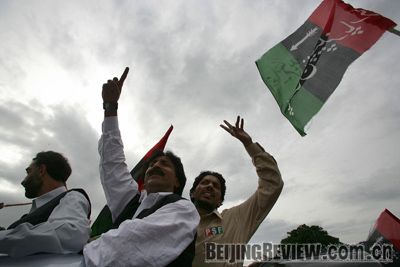|

ALL CHEERS: Supporters celebrate in Islamabad on September 6,
after Asif Ali Zardari won Pakistan’s presidential election.
The PML-N is the second largest party in the National Assembly, occupying 91 of its 342 seats. Since Musharraf stepped down, the former ruling PML-Q has showed signs of splitting. The PML-Q, a breakaway group from the PML-N, has 54 seats in the National Assembly. Many of its parliamentarians are secretly in touch with the PML-N and are likely to rejoin the party. This trend, as well as the support of some independent parliamentarians, has strengthened the PML-N enough to check the PPP-led government. With its rich experience in political struggles, the PML-N stands ready to replace the PPP if it fails.
The PML-N also boasts an absolute advantage in Pakistan's pivotal province-Punjab. The province, which is home to more than half the nation's population, is a major source of Pakistan's soldiers. In history, Punjab's ruling party would always rise to take over the reins of the Central Government. PML-N leader Nawaz Sharif's younger brother, Shahbaz Sharif, is the current head of Punjab's provincial government and enjoys widespread popularity. In the presidential election, Zardari received far fewer votes from Punjabi representatives than his PML-N opponent, a testament to the PML-N's solid status in the province.
The PML-N is a veteran political party in Pakistan that represents the interests of Punjab's major capitalists. Its leader, Nawaz Sharif, served as the country's prime minister twice in the 1990s before being ousted by Musharraf in 1999 and going into exile. A politician like him will never be satisfied with a position below Zardari. He has designs on a third term as prime minister and will be Zardari's biggest rival.
Social headaches
On top of this, Pakistan's economic crisis has deepened against the backdrop of soaring oil prices and a global economic slowdown. The country's stock market has plummeted 40 percent since April. Inflation hit 25 percent in August, a 30-year high. Meanwhile, the Pakistani rupee is depreciating rapidly against the U.S. dollar. Pakistan's trade deficit increased to $20.77 billion in the 2007-08 fiscal year, accounting for 12.3 percent of its gross domestic product. Its foreign exchange reserve decreased from $16.49 billion in October 2007 to $10.49 billion in July 2008. Pakistan is one of the 39 countries with the most severe food shortages. Power is also in short supply and blackouts are common, even in the capital city of Islamabad.
|
